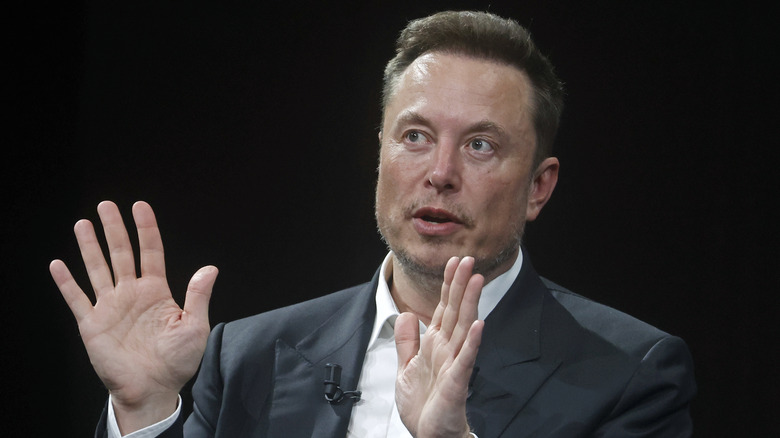Shark Tank's Worst Pitch & Elon Musk's Neuralink Share A Disturbing Similarity
Years after Darrin Johnson pitched his Bluetooth device Ionic Ear, the episode continues to leave the jaws of "Shark Tank" investors and fans on the floor. However, it's looking like a concept similar to what has often been deemed the show's worst pitch could be closer to becoming a reality than you might have expected.
On the first episode of "Shark Tank," Johnson was looking for a $1 million investment in Ionic Ear in exchange for 15% of the company. The product is a Bluetooth device that is surgically implanted into the user's ear, which he feels will solve the issue of traditional Bluetooth technology's tendency to fall out of ears. The device requires an elongated needle to be inserted in the ear every night for charging, and customers need to receive another surgery to get an update — a detail that makes the sharks freak out at the prospect. While he tries convincing the investors that further testing would aid in public perception, it does little to change their minds. The failed presentation, delivered with a cold and ominous vibe, has gone down in infamy as one of the show's least viable products, with Barbara Corcoran bluntly calling it the worst pitch she's ever heard.
However, another business titan might soon succeed where Johnson failed. In 2017, Tesla and SpaceX CEO Elon Musk and several colleagues launched Neuralink. The company intends to make devices like the Ionic Ear that can be surgically placed inside patients' heads, directly in their brains. However, whereas Johnson's product failed inside and outside the tank, Neuralink has already taken some major steps forward.
Musk's idea has made some startling progress
It's possible that Elon Musk would call Darrin Johnson's Ionic Ear ahead of its time. For the past few years, Musk's neurotech startup Neuralink has been developing a special brain implant with the intent of saving lives but has birthed some valid concerns in the process.
Musk and company's implanted device, known as the Link, could possibly allow users to control external technology using brain functions, giving those with severe physical conditions the ability to function like never before. In May, Neuralink took a big step forward as it was approved by the FDA to begin conducting human trials, which will soon see volunteers going through invasive brain surgery.
Neuralink has the chance to do some good, but there is the possibility of it causing greater harm than the Ionic Ear ever could. Having a device in your ear is concerning enough, but a whole new level of danger is involved if a brain implant is used irresponsibly. According to Reuters, there could already be evidence that the team is having to rush their progress. The 2022 report touches on how "Musk's demands to speed research" led to Neuralink employees feeling rushed, hindering their research and work. And while animal casualties are common in trial-and-error experimentation involving human healthcare advancement, the same article mentioned how "the company has killed about 1,500 animals, including more than 280 sheep, pigs and monkeys, following experiments since 2018." Employees interviewed by Reuters allegedly admitted that the need for swift results led to unnecessary animal deaths.
Trying to speed through such critical studies and possibly killing thousands of animals in the process is not a comforting sign as the team moves on to human trials. Until we see the outcome of Neuralink's next step, their potential should be taken with a grain of salt.

